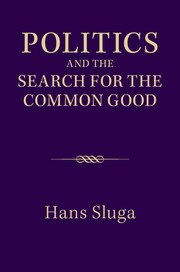Book contents
- Frontmatter
- Contents
- List of figures and tables
- Acknowledgments
- Introduction
- Part I The Search for the Common Good: Beyond the Normative and the Natural
- Part II Three Diagnostic Thinkers in Pursuit of the Common Good
- Chapter 5 Carl Schmitt: “all essential concepts are not normative but existential”
- Chapter 6 Hannah Arendt: “does politics still have a meaning?”
- Chapter 7 Michel Foucault: “could you define the sense you give the word ‘political’?”
- Part III The Fragility of the Common Good
- Bibliography
- Index
Chapter 6 - Hannah Arendt: “does politics still have a meaning?”
Published online by Cambridge University Press: 05 November 2014
- Frontmatter
- Contents
- List of figures and tables
- Acknowledgments
- Introduction
- Part I The Search for the Common Good: Beyond the Normative and the Natural
- Part II Three Diagnostic Thinkers in Pursuit of the Common Good
- Chapter 5 Carl Schmitt: “all essential concepts are not normative but existential”
- Chapter 6 Hannah Arendt: “does politics still have a meaning?”
- Chapter 7 Michel Foucault: “could you define the sense you give the word ‘political’?”
- Part III The Fragility of the Common Good
- Bibliography
- Index
Summary
“What I propose in the following is a reconsideration of the human condition from the vantage point of our newest experiences and our most recent fears,” Hannah Arendt wrote in the prologue to her 1959 book The Human Condition. In a decidedly diagnostic tone of voice, she appealed to five experiences as cues to the state of contemporary politics: the launching of the first satellite into space, the scientific endeavor to create artificial life, the increasing mathematization and formalization of the sciences, the use of computers to do our thinking and speaking, and the automation of factory labor – a curious mixture of a singular technological breakthrough and various scientific and technological developments, none of them political in the straightforward sense. Arendt was sure, however, that they all led to the same diagnosis: an increasing alienation of human beings from their own world – from the earth, from the natural life cycle, from human understanding, from their own inner mental life, and finally even from the conditions and objects of their working existence. In consequence, she was certain, the preconditions of political life were being destroyed as well. Far from wanting to detach political philosophy from experience, as the normative theorists had been trying to do, Arendt, the diagnostician, sought out such experience in order to elicit from it how we are to assess our political situation.
The threats she perceived to our existence as political beings motivated Arendt to consider again and again what the meaning of politics was. This was the question she pursued in The Human Condition; it might be in addition the one that had started her off as a political philosopher. In this chapter I will focus on Arendt’s struggle with this one question while I give the rest of her work a deliberately selective treatment. Like Schmitt and the other diagnostic thinkers, Arendt never aimed at an overall account of her thought and such an account would, probably, also not have been in her spirit. Her writings were almost always provoked by striking occasions (such as the Eichmann trial in Jerusalem) and they spun diverse and loose strands of thought without ever weaving them into a tight single cloth.
- Type
- Chapter
- Information
- Politics and the Search for the Common Good , pp. 146 - 172Publisher: Cambridge University PressPrint publication year: 2014



